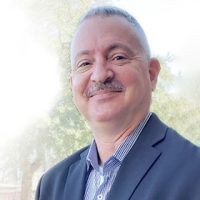This video is an excerpt from CLL Global Research Foundation’s October 2025 Virtual Town Hall featuring CLL Global President, Dr. William Wierda, and Dr. Catherine Wu of Dana-Farber Cancer Institute. Watch the full town hall replay.
Expert Panel:

Dr. Catherine Wu, Chief in the Division of Transplant and Cellular Therapy, Dana-Farber Cancer Institute

Jeff Folloder, Moderator and CLL patient advocate
Transcript:
Jeff Folloder: Can you comment on the NIH spending cuts and how they’re going to impact basic science research and progress in CLL? Is there reason for concern, or is there still hope?
Dr. Catherine Wu: I think we’re in unprecedented times, and it’s very, very difficult to have clarity on what is going to happen down the line.
I think for better or for worse, some of the things that are going on are already having an impact, and the reason I say that is that already – we’re all attached to our iPhones and our newspapers, and there’s a lot of tough reports that are coming down, and I think the group that is most concerned are our young people. I think trainees, people who are on the brink of trying to decide whether or not they’re going to commit to really making their lives work about – for example, CLL research. They’re scratching their heads going, “Maybe I don’t want to sign up for this, and maybe I just step away from this thing that I’ve been working on all my life, and I’m not going to continue on this career.” I’ve already seen that happen, so.
Some of my most promising what-would-be future leaders in biomedical research have decided to take a step aside and do other things. I’ve also seen that currently young people who have really poured blood, sweat, and tears to put together a good proposal for funding, who were funded in the blink of an eye – moment, they received a letter, and the government shut down their funding. And so, of course, I can support them, and I’m not even the worst hit. I have a lot of colleagues who have lost up to nine grants, which is a lot, you can imagine, so it’s a tough time, so you have to really need to keep the faith to keep going and be of an optimistic nature and look at it as a glass half-full, but it’s not half-full right now.
It’s actually quite difficult. And so, I think I’m talking about young people, and I’m talking about currently the day-to-day looks very similar, but I think in order to really do the important stuff, you need a little bit of a runway. You need to have a Pax Romana, a period of peace and tranquility, for all of that fundamental work to happen, and it’s a little bit hard to plan that right now. I think this will also deeply affect the biotech sector, because a lot of the ideas and kind of the personnel that go into the pharmaceutical industry are coming from academia, so if you turn off the tap for young people, then you won’t have a supply chain to go into making drugs, which is what we care about.
I think also within the hospitals, we have to also – I think so far, there is a concern of kind of turning off the tap for support of clinical trials, and that we know is what is really needed in order to change practice. The final aspect is that from where I stand, Bill and I, Dr. Wierda and I, both go to many, many national and international conferences, and all our international colleagues have never received more applications from Americans than before that are really trying to look for job opportunities.
Because they’re being shut off right now by our current crisis. So, I think our loss is someone else’s gain, but I’m not sure that that’s a loss that we really want. So, it is an unprecedented time, and we’re all keeping our eyes on the prize, but you have to kind of turn off some of the noise, because there is a lot of noise right now.

